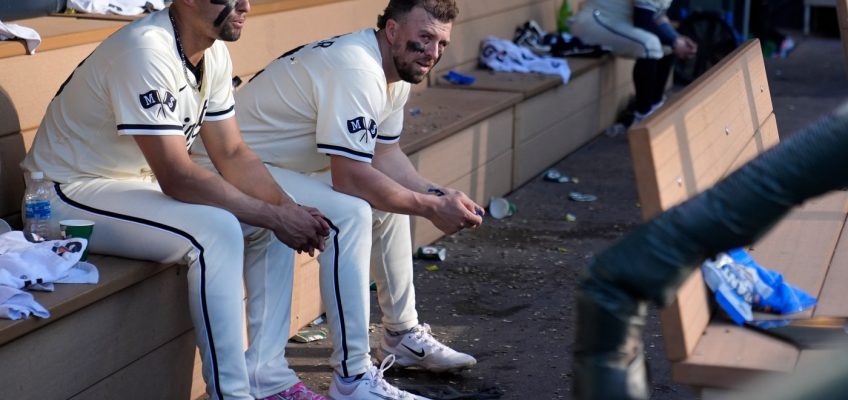The Twins sped out of the 2024 season like a luger on greased ice, rapidly and without agency. They lost 27 of their last 38 games, and for those who doom-scrolled the collapse, it was a wonder they won 11.
On Sunday, it ended with a crash appropriate to the pace with which the Twins plummeted from the postseason race, and the grandson of the former owner telling reporters — and, hence, fans — that it’s just business.
Joe Pohlad, the ownership family’s official Twins czar as its Executive Chair, met with reporters before Sunday’s 6-2 loss to the Baltimore Orioles at Target Field and didn’t do a great job of convincing the team’s emotional stake-holders that the Pohlad Family has their best interests in mind.
Twins fans aren’t stupid. No one was more aware that their team won the American League Central and three playoff games in 2023, their first postseason victories since 2004, and that rather than invest in the momentum, ownership cut payroll by about $30 million.
“We were headed down a great direction. and I had to make a very difficult business decision,” Pohlad said. “But that’s just the reality of my work. I have a business to run, and it comes with tough decisions, and that’s what I had to do. I wouldn’t make any other decision.”
Cue record scratch, or for the visually inclined, a gif of the H-bomb landing on Bikini Atoll. He might as well have added, “You just don’t get it.” It was what Twins fans didn’t want to hear, especially from the scion of a billionaire family who inherited his position as the team’s ultimate decision-maker.
The Twins were in serious playoff contention through late August, yet the team was one of nine to draw fewer than 2 million fans in 81 home games this season. If cutting that payroll was a tough business decision, maybe it was a bad one, too.
Certainly Pohlad spoke as if he’s the one pulling the levers. Of his time spent watching the last month and a half of the season, he said, “it feels like I’m watching a trainwreck.” Later, while explaining why president of baseball operations Derek Falvey and manager Rocco Baldelli will be back next season — side note: they should be — Pohlad said, “I don’t judge employees off of six crummy weeks.”
Uh, thanks?
Making Pohlad available to the team’s beat writers was the right thing to do, and it’s worth noting that ownership has been admirably conspicuous about backing issues affecting its fan base — most notably Black Lives Matter and LGBTQ+ initiatives. That doesn’t go unnoticed. It’s also worth noting that team payroll isn’t everything. AL Central champion Cleveland spent less than the Twins this season, as did the Tigers and Royals, who overtook the Twins for wild-card spots. So did NL Central champion Milwaukee.
But here’s the rub. People don’t understand billionaires, even relatively wealthy people. They’ll never see that kind of money, let alone decide how to spend it. The 99 percent is living paycheck to paycheck trying to buy groceries, make a car payment and stay up to date on rent or, if they’re lucky, the mortgage.
People who have worked for what they have without a net, people who understand how close they sometimes are to financial ruin, see those with a billion or more dollars and say, “Well, here’s what I would do!” And it’s usually not run a baseball team like a business. Maybe that’s because we’re unwashed dummies; maybe it’s because we understand there are more important things than money.
There’s little doubt that major league owners believe in their hearts that business is business and there is a plan and a ledger and projections and it all has to work out financially. The problem, of course, is that America’s pastime is business for only about 30 Americans, and there are 333 million Americans.
For fans of Major League Baseball’s 30 teams, it’s a personal bond expressed in attendance, bumper stickers and authentic team jerseys currently selling for between $150 and $350 online. Many of them also paid for a substantial chunk of Target Field. They don’t want to hear that ownership was able to keep the tote board at $1,000,000,000.
Certainly, the Twins’ collapse was more spectacular than it had to be. Yes, they were starting three rookies in the rotation, and missing injured stars Carlos Correa and Byron Buxton for large swaths of that stretch, but it was a disgraceful run that ended with losses in seven of their last eight games, during which they were outscored 41-16.
Yet the ultimate kick in the shins came before the last loss, when Twins fans were reminded that the object of their affection is just business for billionaires. Luxury tax aside, there was nothing stopping Twins ownership from spending more. Not doing so was a bad look in April, and with October on the doorstep, it looks even worse.
Related Articles
Joe Pohlad defends decision to cut payroll; payroll not expected to drop next year
As disappointing season winds to a close, Twins reaffirm faith in Derek Falvey, Rocco Baldelli
Twins blown out by Orioles as search for answers begins
Despite Twins’ collapse, manager Rocco Baldelli said he’s not stressed about job security
Twins officially eliminated from wild card race after late-season collapse


Leave a Reply